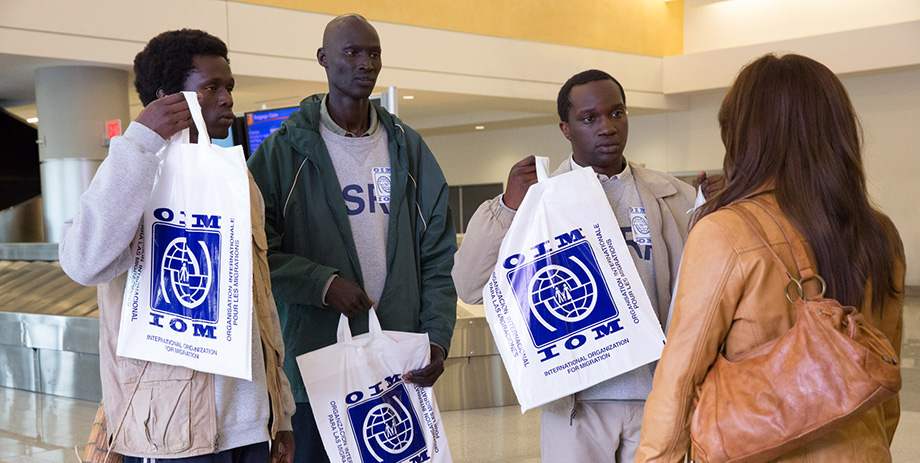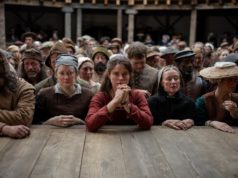Reese Witherspoon bought the rights to Gone Girl and wanted to star in it until David Fincher convinced her otherwise. While staying on that film as a producer, she headlines another movie that comes out this week, The Good Lie. Actually, her role is closer to a supporting one, but she’s the only actor familiar to Western audiences. It’s admirable that she’s using her stardom to draw people to a film about the Sudanese genocide. I just wish she had a better movie to draw people to.
The prologue takes place in 1987, when northern Sudanese militia members massacre the inhabitants of a village in southern Sudan, leaving the chief’s younger son, Mamere Deng (Peterdeng Momok), in charge of leading a handful of smaller children to a refugee camp in neighboring Kenya. In early 2001, a grown-up Mamere (Arnold Oceng) and fellow villagers Paul and Jeremiah (Emmanuel Jal and Ger Duany) finally leave their camp to resettle in Kansas City, though bureaucratic regulations force Mamere’s sister, Abital (Kuoth Wiel), to be relocated in Boston. The woman in charge of helping the Africans acclimate to America seems to spend most of her time doing something else that the movie never explains, so her work falls to Carrie Davis (Witherspoon), the employment agency counselor tasked with finding jobs for these men.
I’m glad that the filmmakers make an effort not to shape this as the story of a heroic white woman rescuing these Africans. The trouble is, there’s not much shape to this story at all. Director Philippe Falardeau snagged an Oscar nomination for his 2011 French-Canadian drama Monsieur Lazhar, but that movie was essentially small in scale. Here he’s working with a bigger canvas, and it defeats him. His storytelling is astonishingly poor: An immigration official (Victor McCay) warns Carrie that getting Abital to Kansas City will be a nightmare in the wake of the 9/11 terrorist attacks, but then the problem is solved in the very next scene. The prologue is way too long and could have been dealt with much easier in flashbacks. Jeremiah’s voiceover narration is clumsily handled as well.
Not that the white characters are drawn in novelistic detail, but the Sudanese are reduced to basically one trait each: Mamere is studious, Jeremiah is a devout Christian, and Paul likes to have a good time. The movie seems to sense that the relocation process is a shambles, but only a drunken Paul ever bothers to point this out, and the movie seems uncomfortable with that. Documentaries like 2003’s Lost Boys of Sudan and 2006’s God Grew Tired of Us gave much more detail about the particular challenges these immigrants face.
While most of the Sudanese are portrayed by actual refugees from the war, Oceng is a British actor of Ugandan descent, and he has the most rewarding part here. As Mamere gives up his place in America so that his older brother (Femi Oguns) can escape the war, Oceng seems to grow into a man worthy of being a chief before our eyes. This performance deserved a much better movie than The Good Lie.
[box_info]
The Good Lie
Starring Arnold Oceng and Reese Witherspoon. Directed by Philippe Falardeau. Written by Margaret Nagle. Rated PG-13.
[/box_info]













I think Kristian Lin has really missed the point of this movie. Obviously, Lin did not like the movie. I would like to know what changes Lin would want to see in order to make this film more “shape”ly. It’s a travesty that not more attention was brought to this movie. I actually think the fact that is lacks “shape” is representative of the lack of shape in the recovery of many of the refugees. Brother Paul was not “drunk” in the movie. He was stoned, and missing this small detail discredits Lin’s review. The performances of all the cast were spectacular. Reese Witherspoon received a new level of respect from me for her performance. With her minor role, she shines, and not because she took center stage, but because she did not attempt to take center stage. Be realistic, Lin, Oceng is a strong actor. But honestly, in America, African Americans rarely receive the roles they deserve, and even when they get roles, they do not receive the attention they deserve. Look back through the Academy history.
I thought it was a tremendous movie-agree with the above. I was hooked seeing a part of it at church, so much so I bought it. All the black negativity, I suggest you ask the poor Lost Children to see if they think they are better off in America or would they prefer being in the camp. All the parts that was trashed, I just cannot agree with. As far as Reese putting her name on it-I’m glad she did. It is great work, perhaps not enough sex & violence & perhaps if they just left God out of it altogether she would think this a hit.?
So America is perfect and no one has any reason to complain? Or is that just black people who should shut up? I’m trying to figure out what kind of racist you are, SJ. Help me out here.